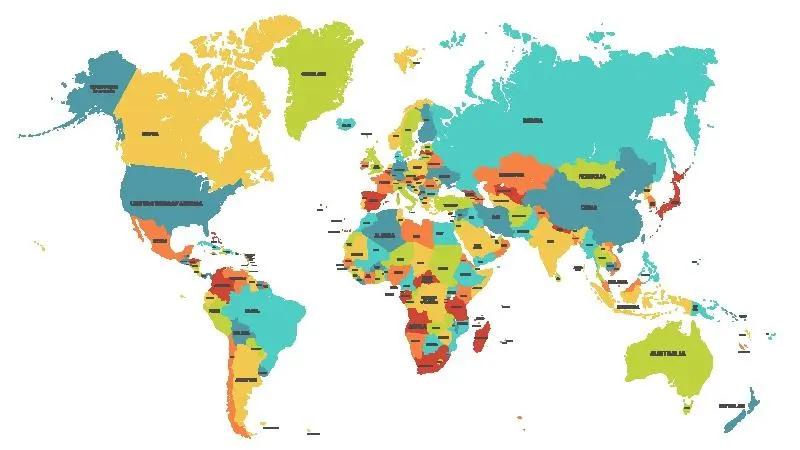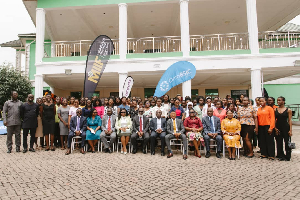By Ojo Emmanuel Ademola
Copyright businessday

In today’s fast-paced digital world, the landscape of work has undergone a bold transformation that redefines how and where we engage in our professional lives. It’s time to abandon the outdated confines of traditional office spaces and the dull nine-to-five grind. We are firmly entrenched in a dynamic and multifaceted work environment that demands flexibility and agility, empowering us to adapt and excel in the face of constant change. The future of work is not just here; it’s vibrant, and it’s exhilarating!
The integration
We’re stepping into an exciting new era of work, where technology seamlessly weaves into our everyday tasks. This integration has transformed how we collaborate and communicate, breaking down geographical barriers like never before. With tools like cloud computing, video conferencing, and innovative collaborative software at our fingertips, teamwork and productivity can thrive no matter where we are in the world. Embracing these advancements not only enhances our work experience but also empowers us to connect and achieve more together!
Moreover, innovation plays a pivotal role in this evolving work environment. Organizations are no longer just competing on the basis of products and services but also on their ability to adapt quickly to market trends and consumer needs. Embracing a culture of innovation encourages employees to think creatively and take risks, ultimately driving the organization forward.
Adaptability has emerged as a critical skill in this landscape. The ability to pivot in response to new challenges and demands is not just advantageous—it has become essential for long-term success. As industries continue to change at a breakneck pace, those who can embrace change and remain agile will thrive, while those who cling to outdated practices may find themselves left behind.
The transformation
The transformation we are currently experiencing signifies a profound shift towards a work environment that prioritizes collaboration, innovation, and adaptability. In this evolving landscape, technology plays a critical role, becoming an integral part of our daily professional routines. This integration not only enhances communication and teamwork but also fosters a culture of creativity and flexibility. As a result, our perceptions of what defines success in the modern workplace are being reshaped. Success is no longer solely measured by traditional metrics such as productivity or profit; instead, it increasingly encompasses the ability to embrace change, leverage new tools, and work cohesively across diverse teams. Ultimately, this new paradigm encourages individuals and organizations alike to be more agile and open to exploring novel approaches to problem-solving and project execution.
The complexities
Navigating the complexities of today’s professional landscape requires a skill set that goes well beyond mere technical proficiency. It calls for cultivating a mindset that is assertive, actively engaging, and strategically forward-thinking. In this rapidly changing environment, individuals must be proactive and adaptable, ready to embrace new challenges and opportunities as they arise. The future of work is not something that lies in the distance; it is an immediate reality that demands action. Organizations and professionals alike must prioritize strategic approaches and innovative solutions to thrive in this dynamic context. Emphasizing collaboration, continuous learning, and resilience will be essential for success in the evolving workplace.
The advent of digital tools and platforms has significantly transformed the landscape of opportunities, making them more accessible to individuals regardless of their geographical location. This democratization means that people can now collaborate seamlessly across different regions and time zones, breaking down traditional barriers that once hindered cross-border teamwork.
Remote work, which was previously seen as a temporary or unconventional option, has evolved into a standard practice in many sectors. This shift has compelled organizations to critically reassess their operational models, necessitating innovative approaches to employee engagement and collaboration. They must now create inclusive environments that cater to a diverse workforce scattered across various locations.
The traits of resilience and agility
In this rapidly changing environment, the traits of resilience and agility have become vital for both individuals and organizations. Instead of being regarded merely as desirable qualities, they are essential competencies that enable teams and leaders to adapt to unforeseen challenges and changing circumstances effectively. Companies that embrace these characteristics are better positioned to thrive in this new landscape, fostering a culture of continuous learning and adaptability to meet both business objectives and employee needs.
The increasing prevalence of artificial intelligence and automation is significantly transforming the landscape of job roles and the skill sets required to succeed in the workforce. As technology continues to advance at an unprecedented pace, workers are faced with the necessity of adaptive learning and continuous professional development. This shift requires individuals to actively engage in upskilling—acquiring new competencies and refining existing ones — to remain competitive in their fields.
In today’s fast-paced digital world, job seekers must be proactive in enhancing their skills and knowledge. Embracing new learning opportunities and seamlessly integrating technology into daily tasks can unlock exciting doors to career advancement. Today’s job market not only prizes technical expertise but also values essential soft skills—such as critical thinking, collaboration, and adaptability. To truly thrive in this ever-evolving landscape, committing to lifelong learning is no longer just an option; it’s a necessity. Stay curious and keep growing—your future self will thank you!
Engagement in the evolving landscape of work requires a strong commitment to cultivating inclusive and diverse environments where creativity and innovation can thrive. It is essential for leaders to champion a culture that not only values every individual’s voice but also actively seeks to empower diverse perspectives. This entails creating an environment where team members feel safe to share their ideas, take risks, and experiment without the fear of failure.
The full potential
To harness the full potential of this creative environment, the role of assertive leadership is indispensable. Leaders need to actively engage in fostering an atmosphere that emphasizes open and transparent communication. This involves not only sharing ideas but also encouraging team members to voice their opinions and perspectives freely.
Deeper collaboration among team members is equally important; leaders should implement structures that facilitate teamwork, such as cross-functional projects or brainstorming sessions. By breaking down silos and encouraging diverse input, leaders can help spark innovative ideas that may otherwise remain undiscovered.
Active listening is another essential component of effective leadership. It’s vital for leaders to truly listen to the thoughts and concerns of their team, signalling that every member’s contributions are valued. This practice can be enhanced through regular feedback sessions and one-on-one meetings that allow for personal connection and understanding.
By prioritising these elements—open communication, collaborative efforts, and genuine listening—leaders can cultivate a profound atmosphere of trust and mutual respect within their organisations. This nurturing environment will not only empower individuals but also create a vibrant culture where creativity and innovation can truly thrive, leading to transformative results for the organization as a whole.
The realm of possibilities that we refer to as “the wild” represents an exciting landscape filled with opportunities for growth and exploration. It is through a combination of determined leadership and collaborative efforts that teams can navigate these possibilities effectively. By embracing diversity and encouraging experimentation, organizations can develop innovative solutions that meet the complex challenges of today’s world, ultimately driving success and progress for everyone involved.
In closing, thriving in the digital age means wholeheartedly embracing change, honing our digital skills, and dedicating ourselves to lifelong learning. As we find ourselves at the crossroads of tradition and innovation, let’s take bold strides into the future of work with confidence and a clear sense of purpose!



